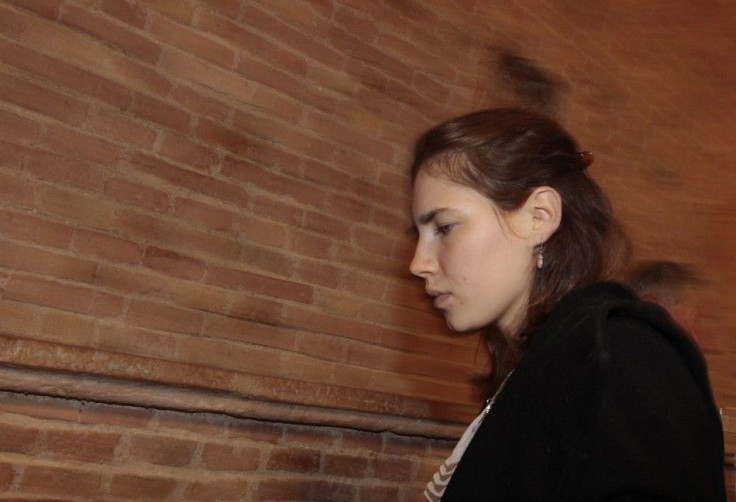The Amanda Knox Case: 5 Things to Know
ANALYSIS

Amanda Knox listened to the final arguments of her appeals trial in Perugia, Italy on Tuesday. The American woman charged with the 2007 murder of British student Meredith Kercher had to sit in court as prosecutors branded her as a sex-crazed, drug-fueled diabolical she devil and femme fatale.
Knox's lawyers responded by saying that Knox was like Jessica Rabbit, the cartoon character who famously said I'm not bad. I'm just drawn that way.
Jessica Rabbit looks like a man-eater, but she is a faithful and loving woman, said Knox's lawyer, Giulia Bongiorno.
The trial has proved to be one of the most confusing and intriguing cases in recent memory. The differences between the American and Italian legal system, culture and media have made this case arabesque and often frustrating. With the judge only a week or so away from making the next, and possibly final, ruling, here are the five things to know about the case.
5) The People Involved
Amanda Knox, her Italian boyfriend Raffaele Sollecito and a man named Rudy Guede have all been convicted for having a role in Kercher's murder. Kercher was a British student living with Knox in Perugia, where they both studied at an Italian language university in the fall of 2007.
Kercher was found dead in November, her throat slit after an alleged sexual assault. Guede, who was born in the Ivory Coast in Africa and moved to Perugia when he was a boy, was the first person tried and convicted of the murder. He is thought to have had sex with Kercher on the night of her death, and police found shoe and hand prints in Kercher's blood that they attributed to Guede.
Guede had trouble with the law in the past, and was caught with stolen items on multiple occasions. A teacher also claimed to have seen Guede with a 16-inch knife just two weeks before Kercher was killed. It's also been suggested that Guede was Knox's drug dealer.
There's also Diya Patrick Lumumba, the Perugia bar owner who Knox originally accused of the murder. Lumumba is suing Knox for slander.
4) The Evidence
The biggest and most controversial pieces of evidence in the case are DNA-related. Police found DNA matching both Knox and Sollecito on Kercher's bra clasp, which originally suggested to investigators that the British student was killed during a sex-game gone wrong. The clasp was found six weeks after the murder.
Knox's DNA was also found on a knife blade and handle in Sollecito's apartment, where the two had spent the night when Kercher was killed.
But independent, court-appointed experts told the Italian court in June that the DNA evidence was inconclusive, and could have been tainted during the investigation. Some reports also suggest that a knife found in Sollecito's flat was too large to have inflicted the particular wounds on Kercher's body.
The court ruled against retesting the DNA evidence, a move that could work in Knox's favor if judges feel that the findings are too inconclusive.
3) The Sentencing
Guede is three years into a 16-year sentence. Knox was sentenced to 25 years in prison in 2009 and Sollecito to 26.
Under Italian law, all three were allowed to have two appeals trials each. Both of Guede's have been concluded. The first appeals trial for both Knox and Sollecito is now under way in Perugia.
The eventual appeals verdict is impossible to predict. During their closing arguments earlier this week, prosecutors pushed the judge to give Knox a life sentence. Yet, others suggest that Knox could soon be free.
2) The Testimonies
The appeals trial saw a number of provocative testimonies, many of them from new parties that suggested Knox and Sollecito were innocent. The eyewitness who originally told police he saw the two at Kercher's flat on the night on the murder was discovered to be a heroin addict who couldn't remember dates or details.
A prison inmate and child killer named Mario Alessi said in court that Guede told him that his friend actually killed Kercher. Another witness claimed that his brother, a mobster, killed the British student. The man, Luciano Aviello, said that his brother planned on robbing the house when he saw Kercher and he put his hand to her mouth but she struggled. He said he got the knife and stabbed her.
Guede also testified at the appeals trial. A lawyer for the prosecution then read a letter written by Guede in 2010 to a newspaper that stated that Knox and Sollecito committed the horrible homicide of a splendid young girl, Meredith Kercher.
I've always believed this. I've always said who was there in that house on that cursed night, Guede told the Italian court.
The only time that Rudy Guede, Raffaele and I were in the same space has been in court. I'm shocked and anguished. He knows we weren't there and have nothing to do with it, Knox said in June.
1) The Final Verdict:
A judge could make his final ruling as early as Oct. 3.
Sitting and waiting for a verdict that you don't know for sure which way it's going to come down is agonizing, Knox's motther, Edda Mellas, told CBS News.
The only thing that's certain in this case is Knox and Sollecito still deny any wrongdoing. Everything else is up for debate.
© Copyright IBTimes 2025. All rights reserved.





















